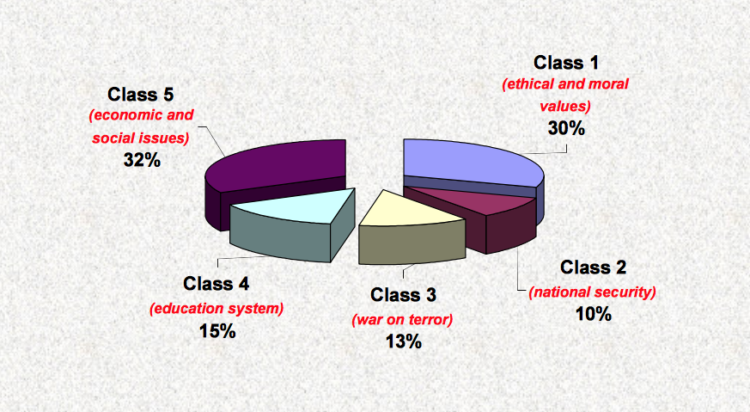Lexical Analysis of the Third Presidential Debate between George W. Bush and John Kerry (13th October 2004, Tempe, Arizona) – Giuseppe Milazzo, Giovanna Maiola
The transcription used is the one published by the Commission on Presidential Debates
(Commission on Presidential Debates: www.debates.org)
The lexical analysis programme used is Alceste 4.0
(IMAGE – Informatique Mathématique Gestion: www.smess.egss.ulg.ac.be/lejeune/logiciels/alceste.html)
The analysis of lexical correspondences statistically summarises the language used by the two candidates during the third and final presidential debate on domestic affairs.
Mr. Schieffer’s interventions have been excluded from the analysis.
The format of the final presidential debate is similar to the one of the first debate: no questions from the public and an anchorman, in this case Mr Schieffer of CBS News, as moderator among the two candidates.
The last debate is tuned on domestic affairs. The major areas of discussion are classified in the first and fifth lexical classes, who cover most of the significant sentences.
The first class is dominated by ethical and moral issues; the two candidates answer questions on homosexuality, civil rights, abortion and religion. The word faith is mentioned 18 times in the candidates’ answers, the word marriage 15 times and respect 20 times.
Mr Kerry manages to dominate syntactically this first lexical class.
The other major lexical class covers the most conventional discussion on economic and social issues. The traditional divergences between conservatives and liberals clearly emerge; each candidate is willing to reiterate values and ideals of their parties and talk to their electorate.
President Bush
– defends his fiscal policy,
– reminds the period of recession he had to face during his presidency,
– accuses the opponent to make faint promises
Senator Kerry
– accuses the President to cut taxes only of the richest
– reminds the numbers of Americans who have lost the health insurance
– promises social reforms targeting middle class citizens.
The two most relevant topics of discussion are the health system (the word health is mentioned 52 times) and the tax cuts (the words tax and taxes compare jointly 50 times in the text)
None of the candidates is significantly associated to this class. Mr Kerry makes use of a more rich vocabulary covering a variety of issues while the President muses on the inconsistency of his opponent.
The question of national security takes the debate back to issues of foreign policy and war on terror, as happened in the previous debates.
Mr Bush is associated only to the fourth class of the factor plan. This minor class is related to the education issue, proposed by the President as a pragmatic plan to endorse the problems of increasing unemployment.
